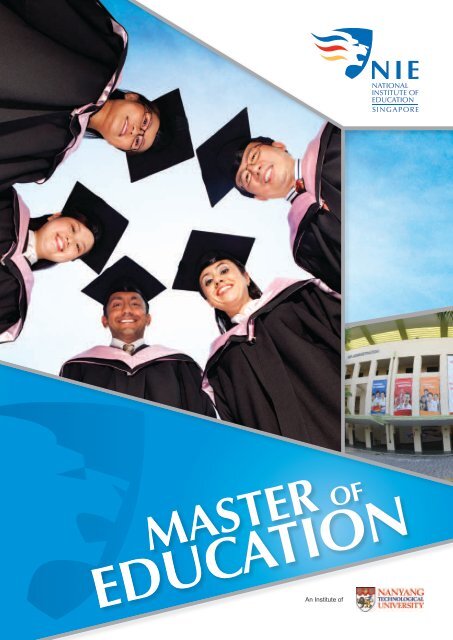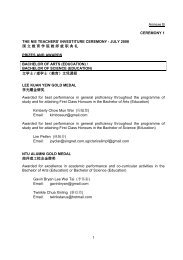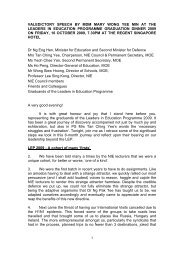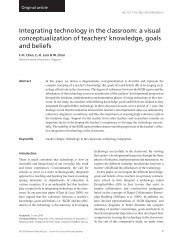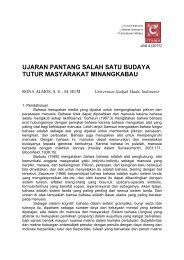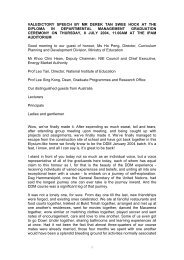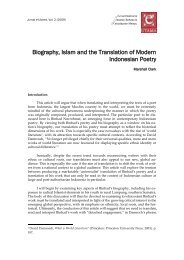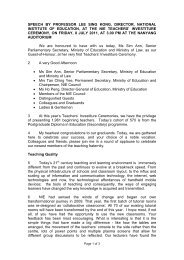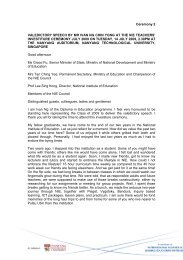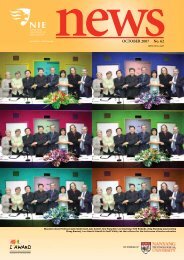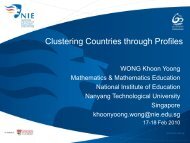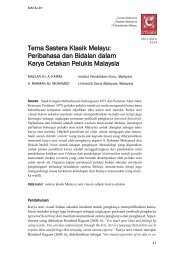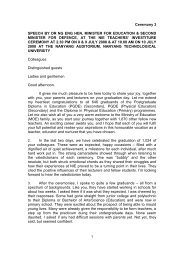MASTER - National Institute of Education
MASTER - National Institute of Education
MASTER - National Institute of Education
You also want an ePaper? Increase the reach of your titles
YUMPU automatically turns print PDFs into web optimized ePapers that Google loves.
<strong>MASTER</strong> OF<br />
EDUCATION
AN INSTITUTE OF<br />
DISTINCTION
The <strong>National</strong> <strong>Institute</strong> <strong>of</strong> <strong>Education</strong> (NIE) is Singapore’s national teacher<br />
education institute with a key role in shaping Singapore’s education.<br />
Established in July 1991 through the amalgamation <strong>of</strong> the <strong>Institute</strong> <strong>of</strong><br />
<strong>Education</strong> and the College <strong>of</strong> Physical <strong>Education</strong>, NIE is an autonomous<br />
institute <strong>of</strong> the Nanyang Technological University (NTU). Through the years,<br />
NIE has positioned itself as the leader in teacher education in Singapore by<br />
producing high quality graduates who form the foundation for a successful<br />
education system.
Master Of<br />
<strong>Education</strong><br />
The Master <strong>of</strong> <strong>Education</strong> programme is primarily designed for educators working in Singapore schools and<br />
the Ministry <strong>of</strong> <strong>Education</strong>. University graduates with a background in education and wishing to advance their<br />
knowledge and skills in education are also welcome to apply. The programme <strong>of</strong>fers the degree in 18 areas <strong>of</strong><br />
specialisation. The programme may be completed either by:<br />
• coursework only, or<br />
• coursework with a dissertation<br />
Duration <strong>of</strong> Study<br />
The programme may be completed in 2 to 4 years on a part-time basis. Full-time studies are also available for<br />
some specialisations.<br />
General Entry Requirements<br />
The following are the necessary requirements:<br />
• a good Bachelor’s degree from a recognised university<br />
• a teaching qualification such as Postgraduate Diploma in <strong>Education</strong><br />
• at least one year <strong>of</strong> teaching or other relevant pr<strong>of</strong>essional education experience<br />
Specific additional entry requirements (if any) are indicated under each specialisation.<br />
International applicants whose first language is not English are required to submit an <strong>of</strong>ficial Test <strong>of</strong> English<br />
as a Foreign Language (TOEFL) score, the test taken not more than two years before the date <strong>of</strong> application.<br />
A minimum score <strong>of</strong> 580 for the paper and pencil examination or 237 for the computer-based test is required.<br />
The International English Language Testing System (IELTS) score <strong>of</strong> 6.5 and above can be accepted in lieu <strong>of</strong><br />
TOEFL.<br />
Intakes<br />
There are two intakes a year (January and August). Applications will open in July for admission in January<br />
in the following year and in December for admission in August the following year. Please note that not all<br />
specialisations are available for application for each intake.<br />
Application<br />
Applications may be made online. Hard copies <strong>of</strong> all necessary supporting documents must be submitted within<br />
one week from the date <strong>of</strong> successful online submission. For more information on application details, please<br />
visit www.nie.edu.sg/gpl/appl_course.htm<br />
Fees<br />
Our tuition fees are subject to revision on a yearly basis. For more information on current tuition fees, please<br />
visit www.nie.edu.sg/gpl/fees.htm<br />
Further Queries<br />
Please visit www.nie.edu.sg/med or e-mail us at nieadmpp@nie.edu.sg<br />
2<br />
<strong>MASTER</strong><br />
OF EDUCATION
Notes to <strong>Education</strong> Officers <strong>of</strong> the<br />
Ministry <strong>of</strong> <strong>Education</strong> (MOE), Singapore<br />
The Master <strong>of</strong> <strong>Education</strong> programme is listed under MOE’s Pr<strong>of</strong>essional Development<br />
Continuum Model (PDCM)-Master’s degree scheme. <strong>Education</strong> <strong>of</strong>ficers sponsored<br />
under this scheme may pursue the master’s degree either by the normal route <strong>of</strong> PDCM<br />
evening classes or through the PDCM 4-3-3 structure, where applicable.<br />
PDCM Evening Classes<br />
Under this arrangement, teachers sign up for 2 courses per semester. The minimum<br />
candidature is 2 years and the maximum 4 years.<br />
PDCM 4-3-3 Structure<br />
Teachers under the PDCM 4-3-3 structure are to complete ten courses - four courses<br />
in Year 1 and three courses in each <strong>of</strong> Years 2 and 3. Completion <strong>of</strong> the programme is<br />
expected to be within 3 years.<br />
Teachers are expected to follow a list <strong>of</strong> pre-determined courses and timeframe. Hence,<br />
the list <strong>of</strong> specialisation courses does not apply to teachers under the PDCM 4-3-3<br />
structure.<br />
<strong>MASTER</strong><br />
OF EDUCATION 3
The Programme<br />
at a Glance<br />
SPECIALISATIONS<br />
PAGE<br />
REFERENCE<br />
STRUCTURE<br />
Art 6<br />
Chinese Language 7<br />
Curriculum & Teaching 8<br />
Developmental Psychology 9<br />
Drama 10<br />
Early Childhood 11<br />
<strong>Education</strong>al & Psychological<br />
Measurement & Evaluation<br />
12<br />
• 2 core courses<br />
• 5 required specialisation courses<br />
• 1 open elective course<br />
• 2 core courses<br />
• 5 required specialisation courses<br />
• 1 open elective course<br />
• 2 core courses<br />
• 3 required specialisation courses<br />
• 3 specialisation elective courses<br />
• 2 core courses<br />
• 3 required specialisation courses<br />
• 2 specialisation elective courses<br />
• 1 open elective course<br />
• 2 core courses<br />
• 5 required specialisation courses<br />
• 1 open elective course<br />
• 2 core courses<br />
• 2 required specialisation courses<br />
• 3 specialisation elective courses<br />
• 1 open elective course<br />
• 2 core courses<br />
• 5 required specialisation courses<br />
• 1 open elective course<br />
Plus either:<br />
• a dissertation<br />
OR<br />
• 2 additional<br />
courses<br />
(1 open elective<br />
and MMM 800<br />
Critical Inquiry)<br />
MMM 800<br />
Critical Inquiry<br />
is open only<br />
for candidates<br />
pursuing the<br />
degree totally by<br />
coursework, and<br />
can be taken only<br />
on completion <strong>of</strong><br />
eight courses.<br />
English Language 13<br />
English Literature 14<br />
• 2 core courses<br />
• 4 required specialisation courses<br />
• 1 specialisation elective course<br />
• 1 open elective course<br />
• 2 core courses<br />
• 2 required specialisation courses<br />
• 3 specialisation elective courses<br />
• 1 open elective course<br />
4<br />
<strong>MASTER</strong><br />
OF EDUCATION
SPECIALISATIONS<br />
PAGE<br />
REFERENCE<br />
STRUCTURE<br />
Gifted <strong>Education</strong> 15<br />
• 2 core courses<br />
• 2 required specialisation courses<br />
• 3 specialisation elective courses<br />
• 1 open elective course<br />
Learning Sciences &<br />
Technologies<br />
16<br />
• 2 core courses<br />
• 4 required specialisation courses<br />
• 2 open elective courses<br />
Malay Language 17<br />
Mathematics 18<br />
Music 19<br />
Primary 20<br />
Science 21<br />
Special <strong>Education</strong> 22<br />
Tamil Language 23<br />
• 2 core courses<br />
• 5 required specialisation courses<br />
• 1 open elective course<br />
• 2 core courses<br />
• 2 required specialisation courses<br />
• 3 specialisation elective courses<br />
• 1 open elective course<br />
• 2 core courses<br />
• 5 required specialisation courses<br />
• 1 open elective course<br />
• 2 core courses<br />
• 5 required specialisation courses<br />
• 1 subject-specific elective course<br />
• 1 open elective course<br />
• 2 core courses<br />
• 4 required specialisation courses<br />
• 2 open elective courses<br />
• 2 core courses<br />
• 2 required specialisation courses<br />
• 3 specialisation elective courses<br />
• 1 open elective course<br />
• 2 core courses<br />
• 4 required specialisation courses<br />
• 2 open elective courses<br />
Plus either:<br />
• a dissertation<br />
OR<br />
• 2 additional<br />
courses<br />
(1 open elective<br />
and MMM 800<br />
Critical Inquiry)<br />
MMM 800<br />
Critical Inquiry<br />
is open only<br />
for candidates<br />
pursuing the<br />
degree totally by<br />
coursework, and<br />
can be taken only<br />
on completion <strong>of</strong><br />
eight courses.<br />
<strong>MASTER</strong><br />
OF EDUCATION 5
ART<br />
This specialisation provides a theoretical and practical base for developing a visual<br />
arts curriculum and pedagogy for schools. It enables art educators to achieve<br />
advanced academic and pr<strong>of</strong>essional development in art education by focusing<br />
on contemporary issues and development in art and art education. It emphasises<br />
both scholarship and students’ own studio practice towards enriching their artistic<br />
knowledge in a multi-cultural setting.<br />
Additional Entry Requirements<br />
• Applicants must be currently involved in art education.<br />
• They must have a degree in Art, or equivalent Art qualifications.<br />
Structure<br />
• Core Courses<br />
MED 871<br />
MED 872<br />
<strong>Education</strong>al Inquiry I<br />
<strong>Education</strong>al Inquiry II<br />
• Required Specialisation Courses<br />
MEA 801<br />
MEA 802<br />
MEA 803<br />
MEA 804<br />
Research and Issues in Art <strong>Education</strong><br />
Art and Technology<br />
Visual Arts and Creativity<br />
Visual Literacy: Teaching and Learning<br />
MEA 805<br />
Art Making and Aesthetics Inquiry<br />
• Open Elective Courses (Choose any 1 course)<br />
• The course(s) to be selected from any <strong>of</strong> the courses <strong>of</strong>fered in NIE’s Master degree programmes.<br />
• Plus either:<br />
• a dissertation OR<br />
• 2 additional courses (1 open elective and MMM 800 Critical Inquiry)<br />
6<br />
<strong>MASTER</strong><br />
OF EDUCATION
Chinese<br />
Language<br />
This specialisation equips Chinese language education pr<strong>of</strong>essionals with in-depth<br />
and wide knowledge <strong>of</strong> theoretical and practical issues in Chinese language education,<br />
thus enabling them to meet the challenges at a higher stage <strong>of</strong> their career. It focuses<br />
primarily on the needs <strong>of</strong> teachers and other pr<strong>of</strong>essionals in the field <strong>of</strong> Chinese<br />
language education, and covers both curricular and pedagogical issues, linguistic<br />
theories and culture. Current linguistic theories and research methodology pertaining<br />
to language teaching and learning are discussed enabling students to implement<br />
small scale studies related to course contents as well as their school language<br />
teaching.<br />
Additional Entry Requirements<br />
• Applicants must be involved pr<strong>of</strong>essionally in Chinese language education.<br />
• They must have a degree in Chinese Studies, or a postgraduate teacher education<br />
qualification specialising in the teaching <strong>of</strong> Chinese.<br />
Structure<br />
• Core Courses*<br />
MED 871<br />
MED 872<br />
<strong>Education</strong>al Inquiry I<br />
<strong>Education</strong>al Inquiry II<br />
• Required Specialisation Courses (Choose any 5 courses)<br />
MCL 800 Chinese <strong>Education</strong>al Linguistics<br />
MCL 801 Language Planning and Language <strong>Education</strong><br />
MCL 802 Chinese Language Curriculum Design and Reform<br />
MCL 803 Language Testing and Related Issues<br />
MCL 805 Classical Chinese Literature and Its Teaching<br />
MCL 806 Modern Chinese Literature and Its Teaching<br />
MCL 807 Information Technology and Chinese Language Teaching<br />
MCL 810 Regional Diversity <strong>of</strong> the Chinese Language and Culture: Comparative<br />
Study and Exploration into Implications in Teaching<br />
MCL 811 Design and Analysis <strong>of</strong> Teaching Materials for Chinese as a Second<br />
Language<br />
MCL 812 The Modern Chinese Script: Applied Studies and Special Issues Related<br />
to the Teaching <strong>of</strong> Chinese Characters<br />
MCL 813 Teaching <strong>of</strong> Listening and Speaking <strong>of</strong> Chinese: Theories and Applications<br />
MCL 814 Teaching <strong>of</strong> Reading and Writing <strong>of</strong> Chinese: Theories and Applications<br />
MCL 815 English-Chinese Translation: Theories, Practices and Its Use in the<br />
Teaching <strong>of</strong> Chinese in Singapore<br />
Note:<br />
1) Optional Specialisation<br />
Courses are <strong>of</strong>fered subject<br />
to demand and availability<br />
<strong>of</strong> faculty expertise. Hence,<br />
not all specialisation courses<br />
are available for selection to<br />
every intake.<br />
• Open Elective Courses (Choose any 1 course)<br />
• The course(s) to be selected from any <strong>of</strong> the courses <strong>of</strong>fered in NIE’s Master degree programmes.<br />
• Plus either:<br />
• a dissertation OR<br />
• 2 additional courses (1 open elective and MMM 800 Critical Inquiry)<br />
* The two core courses, MED 871 and MED 872, are taught in English. All other courses are taught<br />
in Chinese.<br />
<strong>MASTER</strong><br />
OF EDUCATION 7
Curriculum<br />
& Teaching<br />
This specialisation aims at facilitating the growth <strong>of</strong> experienced educators who are<br />
committed to developing advanced pr<strong>of</strong>essional expertise in curriculum and teaching<br />
and will assume leadership roles in their educational settings. Specifically, the<br />
programme provides participants with the foundational know-how and the theoretical<br />
underpinnings <strong>of</strong> the curriculum making process from design and implementation<br />
to evaluation, an informed and critical understanding about curriculum issues in the<br />
local and international contexts and an appreciation <strong>of</strong> their role and responsibilities<br />
as curriculum leaders.<br />
Structure<br />
• Core Courses<br />
MED 871 <strong>Education</strong>al Inquiry I<br />
MED 872 <strong>Education</strong>al Inquiry II<br />
• Required Specialisation Courses<br />
MCT 801 Introduction to Curriculum Theory and Design<br />
MCT 802 The Curriculum in Singapore: A Critical Perspective<br />
MCT 803 Crafting the Curriculum: From Theory to Practice<br />
• Specialisation Elective Courses (Choose any 3 courses)*<br />
MCT 804 Curriculum Implementation: Major Concepts and Issues<br />
MCT 805 Differentiating Curriculum and Teaching for Diverse Learners<br />
MCT 806 Curriculum Development for Early Years <strong>of</strong> Schooling (3-8 years old)<br />
MCT 809 History and Reform in Curriculum<br />
MCT 811 Teacher Knowledge, Learning Development<br />
MCT 812 Issues in Research on Teaching<br />
MCT 821 Mastering the Art <strong>of</strong> Authentic Assessments<br />
MCT 825 Curriculum Evaluation<br />
MCT 831 Citizenship <strong>Education</strong>: Trends and Issues<br />
MCT 832 Cooperative and Collaborative Learning: Practice, Theory and Research<br />
MCT 841 Theories and Perspectives on Learning<br />
Note:<br />
1) Optional Specialisation<br />
Courses are <strong>of</strong>fered subject<br />
to demand and availability <strong>of</strong><br />
faculty expertise. Hence, not<br />
all specialisation courses<br />
are available for selection to<br />
every intake.<br />
• Plus either:<br />
• a dissertation OR<br />
• 2 additional courses (1 open elective and MMM 800 Critical Inquiry)<br />
* Students have the option to select curriculum-related courses <strong>of</strong>fered in other programmes and<br />
specialisations subject to the approval <strong>of</strong> the programme coordinator.<br />
8<br />
<strong>MASTER</strong><br />
OF EDUCATION
Developmental<br />
Psychology<br />
This specialisation provides education pr<strong>of</strong>essionals, such as teachers and<br />
counsellors in primary and secondary schools, with in-depth knowledge and<br />
understanding <strong>of</strong> cognitive, social and emotional development. Topics discussed<br />
include child and adolescent cognitive, social, emotional and moral development,<br />
current issues concerning youth and basic counselling skills.<br />
Structure<br />
• Core Courses<br />
MED 871<br />
MED 872<br />
<strong>Education</strong>al Inquiry I<br />
<strong>Education</strong>al Inquiry II<br />
• Required Specialisation Courses<br />
MDP 801<br />
MDP 802<br />
MDP 803<br />
Social and Emotional Development <strong>of</strong> Children and Adolescents<br />
Child and Adolescent Cognitive Development<br />
Counselling Children and Adolescents<br />
• Specialisation Elective Courses<br />
MDP 804<br />
MDP 805<br />
Motivation, Volition and Instruction<br />
Individual Differences and Learning<br />
• Open Elective Courses (Choose any 1 course)<br />
• The course(s) to be selected from any <strong>of</strong> the courses <strong>of</strong>fered in NIE’s Master degree programmes.<br />
• Plus either:<br />
• a dissertation OR<br />
• 2 additional courses (1 open elective and MMM 800 Critical Inquiry)<br />
<strong>MASTER</strong><br />
OF EDUCATION 9
Drama<br />
This specialisation provides opportunities for advanced academic study in drama and<br />
pr<strong>of</strong>essional practice in drama and drama education. It addresses drama performance<br />
and processes, their application to educational contexts, and the multidisciplinary<br />
approach needed for drama learning and performance. Both theoretical and practical<br />
issues <strong>of</strong> drama pedagogy are discussed, focusing on contemporary issues in drama<br />
and drama education. Participants will develop insight and understanding <strong>of</strong> the<br />
creative processes <strong>of</strong> drama and drama education, including performance, and skills<br />
in the teaching <strong>of</strong> drama as a subject and as a vehicle for learning. They will also<br />
explore the functions <strong>of</strong> drama and the theatre in a range <strong>of</strong> contexts.<br />
Additional Entry Requirements<br />
Applicants are expected to have some experience in the teaching <strong>of</strong> drama.<br />
Structure<br />
• Core Courses<br />
MED 871<br />
MED 872<br />
<strong>Education</strong>al Inquiry I<br />
<strong>Education</strong>al Inquiry II<br />
• Required Specialisation Courses (Choose any 5 courses)*<br />
MDR 810<br />
MDR 811<br />
MDR 812<br />
MDR 813<br />
MDR 814<br />
MDR 815<br />
MDR 816<br />
MDR 817<br />
MDR 818<br />
Performance, Play and Performativity<br />
Present-Day Performance Practice<br />
Theatre Making: Vision, Context, Process and Collaboration<br />
Aesthetics and Performance in South East Asian Theatre<br />
The Forms <strong>of</strong> Applied Theatre and Applications in the Local Context<br />
Independent Study<br />
Learning In, Through and About Drama<br />
Advanced Process Drama<br />
Text to Performance<br />
• Open Elective Courses (Choose any 1 course)<br />
• The course(s) to be selected from any <strong>of</strong> the courses <strong>of</strong>fered in NIE’s Master degree programmes.<br />
Note:<br />
1) Optional Specialisation<br />
Courses are <strong>of</strong>fered subject<br />
to demand and availability <strong>of</strong><br />
faculty expertise. Hence, not<br />
all specialisation courses<br />
are available for selection to<br />
every intake.<br />
• Plus either:<br />
• a dissertation OR<br />
• 2 additional courses (1 open elective and MMM 800 Critical Inquiry)<br />
* Students have the option to select elective courses <strong>of</strong>fered in other programmes and specialisations<br />
subject to the approval <strong>of</strong> the programme coordinator.<br />
10<br />
<strong>MASTER</strong><br />
OF EDUCATION
EARLY<br />
CHILDHOOD<br />
This specialisation makes an in-depth study <strong>of</strong> theories and practices in early<br />
childhood education. The focus is on knowledge and understanding <strong>of</strong> issues in the<br />
art <strong>of</strong> teaching children in their early years, appreciating their social contexts, early<br />
childhood curriculum and pedagogy, and meaning-making through linking related<br />
education theories and practices. Issues are addressed across varied paradigms<br />
and perspectives in contemporary ideas <strong>of</strong> teaching and learning. It extends the<br />
knowledge and expertise <strong>of</strong> early childhood pr<strong>of</strong>essionals, enabling them to develop<br />
innovative teaching programmes for young children.<br />
Structure<br />
• Core Courses<br />
MED 871<br />
MED 872<br />
<strong>Education</strong>al Inquiry I<br />
<strong>Education</strong>al Inquiry II<br />
• Required Specialisation Courses<br />
MSE 803<br />
MSE 804<br />
Investigations in Early Childhood<br />
Issues and Trends in Early Childhood<br />
• Specialisation Elective Courses (Choose any 3 courses)<br />
MSE 806<br />
MSE 809<br />
MSE 813<br />
MSE 814<br />
Curriculum Design and Development<br />
Human Development<br />
Pr<strong>of</strong>essional Studies in Early Childhood<br />
Early Intervention<br />
• Open Elective Courses (Choose any 1 course)<br />
• The course(s) to be selected from any <strong>of</strong> the courses <strong>of</strong>fered in NIE’s Master degree programmes.<br />
• Plus either:<br />
• a dissertation OR<br />
• 2 additional courses (1 open elective and MMM 800 Critical Inquiry)<br />
Note:<br />
1) Optional Specialisation<br />
Courses are <strong>of</strong>fered subject<br />
to demand and availability <strong>of</strong><br />
faculty expertise. Hence, not<br />
all specialisation courses<br />
are available for selection to<br />
every intake.<br />
<strong>MASTER</strong><br />
OF EDUCATION 11
<strong>Education</strong>al & Psychological<br />
Measurement & Evaluation<br />
This specialisation provides in-depth knowledge and understanding <strong>of</strong> assessment<br />
and evaluation theory and practice. Topics discussed include concepts <strong>of</strong> classical<br />
and modern test theories, attitude measurement, methods <strong>of</strong> evaluating school<br />
programmes and use <strong>of</strong> technology for assessment. Through this programme,<br />
teachers and other education pr<strong>of</strong>essionals are equipped to take on leadership roles<br />
at quality assessment and evaluation <strong>of</strong> educational learning. They can serve in<br />
schools, MOE and other institutions as resource persons providing pr<strong>of</strong>essional<br />
expertise and technical support in all matters pertaining to both cognitive, and<br />
affective and attitudinal assessment and evaluation.<br />
Structure<br />
• Core Courses<br />
MED 871<br />
MED 872<br />
<strong>Education</strong>al Inquiry I<br />
<strong>Education</strong>al Inquiry II<br />
• Required Specialisation Courses<br />
MPM 801<br />
MPM 802<br />
MPM 803<br />
MPM 804<br />
MPM 805<br />
<strong>Education</strong>al Measurement: Theory and Practice<br />
Modern <strong>Education</strong>al Measurement Theory and Its Application<br />
Computer Assisted Assessment<br />
Attitude Measurement and Personality Assessment<br />
Evaluation Methodology and Applications to Programmes<br />
• Open Elective Courses (Choose any 1 course)<br />
• The course(s) to be selected from any <strong>of</strong> the courses <strong>of</strong>fered in NIE’s Master degree programmes.<br />
• Plus either:<br />
• a dissertation OR<br />
• 2 additional courses (1 open elective and MMM 800 Critical Inquiry)<br />
12<br />
<strong>MASTER</strong><br />
OF EDUCATION
English<br />
Language<br />
This specialisation focuses on processes <strong>of</strong> language learning, teaching<br />
methodology and issues pertaining to language education research. Participants will<br />
be encouraged to build upon their teaching experience via pursuing special and<br />
related areas <strong>of</strong> interest in an in-depth manner. They will also learn critical inquiry<br />
and action-research skills and apply these to language education problems, thus<br />
building a strong foundation for their understanding and practice <strong>of</strong> English Language<br />
education.<br />
Additional Entry Requirements<br />
Applicants must be currently teaching English.<br />
Structure<br />
• Core Courses<br />
MED 871<br />
MED 872<br />
<strong>Education</strong>al Inquiry I<br />
<strong>Education</strong>al Inquiry II<br />
• Required Specialisation Courses<br />
MEL 810<br />
MEL 811<br />
MEL 812<br />
MEL 813<br />
English Language Teaching Approaches<br />
Developing Competence in Writing and Grammar<br />
Developing Reading Competence and Vocabulary<br />
Developing Competence in Listening and Speaking<br />
• Specialisation Elective Courses (Choose any 1 course)<br />
MEL 814<br />
Language Testing<br />
Language <strong>Education</strong> Research Electives:<br />
MAE 805<br />
MAE 807<br />
MAE 809<br />
MAE 810<br />
MAE 811<br />
MAE 812<br />
Classroom Discourse Analysis<br />
Language Teacher <strong>Education</strong><br />
Oracy Development and Research<br />
Research in Teaching Written Discourse<br />
Second Language Classroom Learning<br />
Using ICT in the Language Classroom<br />
Classroom Applications Electives:<br />
MAE 827<br />
MAE 828<br />
MAE 829<br />
Language Teaching Methodology<br />
Language Testing and Assessment<br />
Materials Design and Development<br />
• Open Elective Courses (Choose any 1 course)<br />
• The course(s) to be selected from any <strong>of</strong> the courses <strong>of</strong>fered in NIE’s Master degree programmes.<br />
• Plus either:<br />
• a dissertation OR<br />
• 2 additional courses (1 open elective and MMM 800 Critical Inquiry)<br />
Note:<br />
1) Optional Specialisation<br />
Courses are <strong>of</strong>fered subject<br />
to demand and availability <strong>of</strong><br />
faculty expertise. Hence, not<br />
all specialisation courses<br />
are available for selection to<br />
every intake.<br />
<strong>MASTER</strong><br />
OF EDUCATION 13
English<br />
Literature<br />
This specialisation enhances course participants’ theoretical understanding and<br />
practical skills <strong>of</strong> English literature teaching, and provides them the wherewithal<br />
to undertake critical inquiry and research into an area that interests them. It is an<br />
advanced study <strong>of</strong> literary texts and the teaching <strong>of</strong> them in classrooms. Participants<br />
will be exposed to in-depth studies in the many areas <strong>of</strong> literary education, including<br />
historical and critical perspectives, the use <strong>of</strong> technology and digital media in the<br />
literature classroom, and literature pedagogy. Participants will be encouraged to<br />
build upon their expertise in literary studies and draw on their teaching experience.<br />
They will pursue special areas <strong>of</strong> interest in literature and its teaching.<br />
Additional Entry Requirements<br />
Applicants should have a degree in English Literature, or English Language /<br />
Linguistics. Holders <strong>of</strong> a degree in another Humanities subject (e.g. History,<br />
Philosophy, Drama, and Theatre Studies), will be considered on a case by case basis.<br />
Structure<br />
• Core Courses<br />
MED 871<br />
MED 872<br />
<strong>Education</strong>al Inquiry I<br />
<strong>Education</strong>al Inquiry II<br />
• Required Specialisation Courses<br />
MLE 801<br />
MLE 802<br />
Developing Reading Skills in the Literature Classroom<br />
Literature, Culture and <strong>Education</strong><br />
Note:<br />
1) Optional Specialisation<br />
Courses are <strong>of</strong>fered subject<br />
to demand and availability <strong>of</strong><br />
faculty expertise. Hence, not<br />
all specialisation courses<br />
are available for selection to<br />
every intake.<br />
• Specialisation Elective Courses (Choose any 3 courses)<br />
MLE 806<br />
MLE 807<br />
MLE 808<br />
MLE 809<br />
MLE 810<br />
MLE 811<br />
MLE 812<br />
MLE 813<br />
MLE 814<br />
MLE 815<br />
Texts in the Literature Classroom<br />
Teaching Shakespeare<br />
Literary Theory and Teaching<br />
Creative Writing in the Classroom<br />
World Literatures<br />
Teaching Literature in the Digital Age<br />
Literature and Visual Culture in the Classroom<br />
Adolescent Literature<br />
Literature Assessment: Issues in Approach and Design<br />
Teaching Contemporary British Literature<br />
• Open Elective Courses (Choose any 1 course)<br />
• The course(s) to be selected from any <strong>of</strong> the courses <strong>of</strong>fered in NIE’s Master degree programmes.<br />
• Plus either:<br />
• a dissertation OR<br />
• 2 additional courses (1 open elective and MMM 800 Critical Inquiry)<br />
14<br />
<strong>MASTER</strong><br />
OF EDUCATION
Gifted<br />
<strong>Education</strong><br />
This specialisation creates a platform for education pr<strong>of</strong>essionals, such as teachers<br />
and educational researchers, to enhance their knowledge, ideas and best practices<br />
at educating and talent-developing high ability learners. It focuses on curriculum,<br />
pedagogy and practice. It prepares pr<strong>of</strong>essionals with commitment and competency<br />
by broadening knowledge and expertise. Current trends, issues and policies on<br />
providing for high ability learners, and approaches to differentiated pedagogies,<br />
based on theory, practice and research, are featured.<br />
Structure<br />
• Core Courses<br />
MED 871<br />
MED 872<br />
<strong>Education</strong>al Inquiry I<br />
<strong>Education</strong>al Inquiry II<br />
• Required Specialisation Courses<br />
MSE 820<br />
MSE 821<br />
Differentiated Pedagogies for High Ability Learners<br />
Understanding High Ability Learners<br />
• Specialisation Elective Courses (Choose any 3 courses)<br />
MSE 830<br />
MSE 831<br />
MSE 832<br />
MSE 833<br />
MSE 834<br />
Affective Needs and Moral Development <strong>of</strong> the Gifted<br />
Identification <strong>of</strong> Potential and Interventions for Talent Development<br />
Critical and Creative Thinking for High Ability Learners<br />
Issues, Policies and Trends in Gifted <strong>Education</strong><br />
Administration and Evaluation <strong>of</strong> Programmes for High Ability Learners<br />
and Talent Development<br />
• Open Elective Courses (Choose any 1 course)<br />
• The course(s) to be selected from any <strong>of</strong> the courses <strong>of</strong>fered in NIE’s Master degree programmes.<br />
• Plus either:<br />
• a dissertation OR<br />
• 2 additional courses (1 open elective and MMM 800 Critical Inquiry)<br />
Note:<br />
1) Optional Specialisation<br />
Courses are <strong>of</strong>fered subject<br />
to demand and availability <strong>of</strong><br />
faculty expertise. Hence, not<br />
all specialisation courses<br />
are available for selection to<br />
every intake.<br />
<strong>MASTER</strong><br />
OF EDUCATION 15
Learning Sciences<br />
& Technologies<br />
This specialisation fosters in-depth understanding <strong>of</strong> the learning sciences towards<br />
equipping participants with research knowledge and skills for conducting relevant<br />
investigations in their own fields <strong>of</strong> pr<strong>of</strong>essional interest. It prepares practicing<br />
educational personnel with competency in educating learners <strong>of</strong> the 21st century<br />
by broadening and deepening their knowledge <strong>of</strong> current learning theories and<br />
research trends. Research methodology and the use <strong>of</strong> technology for learning will<br />
also be featured. Opportunities will be given to do small-scale studies on technologyenabled<br />
pedagogy.<br />
Structure<br />
• Core Courses<br />
MED 871<br />
MED 872<br />
<strong>Education</strong>al Inquiry I<br />
<strong>Education</strong>al Inquiry II<br />
• Required Specialisation Courses (Choose any 4 courses)<br />
MLT 801<br />
MLT 802<br />
MLT 803<br />
MLT 804<br />
MLT 805<br />
MLT 806<br />
MLT 807<br />
MLT 808<br />
MLT 809<br />
Foundations <strong>of</strong> Learning and Knowledge Building<br />
Engaged Learning in Knowledge Building Communities<br />
IT as Cognitive Tools<br />
Design Studio<br />
Design Experiments<br />
Social Foundations for the Learning Sciences<br />
Cognitive Foundations for the Learning Sciences<br />
Design <strong>of</strong> Interactive Learning Environments<br />
Research Methodologies for the Learning Sciences<br />
• Open Elective Courses (Choose any 2 courses)<br />
• The course(s) to be selected from any <strong>of</strong> the courses <strong>of</strong>fered in NIE’s Master degree programmes.<br />
• Plus either:<br />
• a dissertation OR<br />
• 2 additional courses (1 open elective and MMM 800 Critical Inquiry)<br />
Note:<br />
1) Optional Specialisation<br />
Courses are <strong>of</strong>fered subject<br />
to demand and availability <strong>of</strong><br />
faculty expertise. Hence, not<br />
all specialisation courses<br />
are available for selection to<br />
every intake.<br />
16<br />
<strong>MASTER</strong><br />
OF EDUCATION
Malay<br />
Language<br />
This specialisation provides education pr<strong>of</strong>essionals with functionally integrated<br />
academic, experiment and field based study <strong>of</strong> Malay Language <strong>Education</strong>. Research<br />
theories and methods in investigating Malay language, literature and culture in their<br />
socio-cultural contexts will be <strong>of</strong>fered together with current practices and advances<br />
in Malay Language curriculum development and pedagogy for schools. The<br />
specialisation <strong>of</strong>fers theoretical grounding in the Malay language and Malay literature<br />
and culture research, as well as the opportunity to investigate the intersection <strong>of</strong><br />
these fields with language teaching and learning. It enhances the research skills and<br />
knowledge base <strong>of</strong> teachers and other pr<strong>of</strong>essionals in language education.<br />
Additional Entry Requirements<br />
• Applicants should be involved pr<strong>of</strong>essionally in teaching <strong>of</strong> Malay and / or Malay<br />
literature.<br />
• They must have a degree in Malay Studies or its equivalent.<br />
Structure<br />
• Core Courses*<br />
MED 871<br />
MED 872<br />
<strong>Education</strong>al Inquiry I<br />
<strong>Education</strong>al Inquiry II<br />
• Required Specialisation Courses (Choose any 5 courses)<br />
MML 810 Research in Language <strong>Education</strong><br />
MML 811 Issues in Language <strong>Education</strong><br />
MML 812 <strong>Education</strong> in Malay and Islamic Traditions<br />
MML 813 Critical and Creative Thinking to Enhance Learning<br />
MML 814 Language, Literacy and Culture<br />
MML 815 Discourse Analysis<br />
MML 816 Contrastive Linguistic and Error Analysis<br />
MML 817 Literature <strong>Education</strong><br />
MML 819 Theories <strong>of</strong> Grammar<br />
MML 821 Features <strong>of</strong> the Malay Language in Singapore<br />
MML 822 Comparative Linguistics <strong>of</strong> Austronesian Languages<br />
MML 823 Bilingualism and Multilingualism<br />
MML 824 School-Based Curriculum Design for Malay Language Teaching<br />
MML 832 Children’s and Young Adult’s Literature<br />
MML 833 The Use <strong>of</strong> Literary Text in <strong>Education</strong><br />
MML 835 Malay Culture and Values<br />
MML 836 The Sociocultural History <strong>of</strong> the Malays<br />
• Open Elective Courses (Choose any 1 course)<br />
• The course(s) to be selected from any <strong>of</strong> the courses <strong>of</strong>fered in NIE’s Master degree programmes.<br />
Note:<br />
1) Optional Specialisation<br />
Courses are <strong>of</strong>fered subject<br />
to demand and availability <strong>of</strong><br />
faculty expertise. Hence, not<br />
all specialisation courses<br />
are available for selection to<br />
every intake.<br />
• Plus either:<br />
• a dissertation OR<br />
• 2 additional courses (1 open elective and MMM 800 Critical Inquiry)<br />
* The two core courses, MED 871 and MED 872, are taught in English. All other courses are taught<br />
in Malay.<br />
<strong>MASTER</strong><br />
OF EDUCATION 17
Mathematics<br />
This specialisation provides coursework that develops knowledge <strong>of</strong> mathematics<br />
as a subject and its pedagogy. It develops reflective practitioners <strong>of</strong> Mathematics<br />
education, prepares teachers for career development in such capacities as MOE’s<br />
master teacher or senior specialist tracks, and provides induction into mathematics<br />
education research.<br />
Additional Entry Requirements<br />
• Applicants must be currently involved in Mathematics education.<br />
• They must have done at least two Mathematics courses at the undergraduate level.<br />
Structure<br />
• Core Courses<br />
MED 871<br />
MED 872<br />
<strong>Education</strong>al Inquiry I<br />
<strong>Education</strong>al Inquiry II<br />
• Required Specialisation Courses<br />
MME 802<br />
MME 804<br />
Fundamental Concepts in Mathematics<br />
Research and Issues in Mathematics <strong>Education</strong><br />
• Specialisation Elective Courses (Choose any 3 courses with at least one from<br />
each group)<br />
Group A: General Pedagogical Issues in Mathematics <strong>Education</strong><br />
MME 803<br />
MME 805<br />
MME 806<br />
MME 807<br />
MME 812<br />
Using Technology in Mathematics <strong>Education</strong><br />
Assessment in Mathematics<br />
Curriculum Studies in Mathematics<br />
Development on Problem Solving in Mathematics<br />
Teaching and Learning Mathematics<br />
Group B: Topics in Mathematics and Pedagogical Implications<br />
MME 813<br />
MME 815<br />
MME 816<br />
MME 817<br />
MME 819<br />
Algebra and the Teaching <strong>of</strong> Algebra<br />
Geometry and Teaching <strong>of</strong> Geometry<br />
Statistics and the Teaching <strong>of</strong> Statistics<br />
Discrete Mathematics and Problem Solving<br />
Number Theory and the Teaching <strong>of</strong> Arithmetic<br />
Note:<br />
1) Optional Specialisation<br />
Courses are <strong>of</strong>fered subject<br />
to demand and availability <strong>of</strong><br />
faculty expertise. Hence, not<br />
all specialisation courses<br />
are available for selection to<br />
every intake.<br />
• Open Elective Courses (Choose any 1 course)<br />
• The course(s) to be selected from any <strong>of</strong> the courses <strong>of</strong>fered in NIE’s Master degree programmes.<br />
• Plus either:<br />
• a dissertation OR<br />
• 2 additional courses (1 open elective and MMM 800 Critical Inquiry)<br />
18<br />
<strong>MASTER</strong><br />
OF EDUCATION
Music<br />
This specialisation provides a theoretical and practical base for developing music<br />
curriculum and pedagogy for schools, and music education research. It also provides<br />
an understanding <strong>of</strong> contemporary issues in music education and research, and the<br />
foundations <strong>of</strong> music education. Candidates will develop understanding and skills<br />
in the ways technology is used in music and music education. They will select from<br />
a list <strong>of</strong> practical musical skills for teaching in school, including solo and ensemble<br />
performance, composing, arranging, singing, choral conducting, band conducting,<br />
recorder playing and keyboard skills, to promote their expertise in teaching them<br />
during the programme.<br />
Additional Entry Requirements<br />
• Applicants must be currently involved in music education.<br />
• They should have a degree in Music, or equivalent qualifications.<br />
Structure<br />
• Core Courses<br />
MED 871<br />
MED 872<br />
<strong>Education</strong>al Inquiry I<br />
<strong>Education</strong>al Inquiry II<br />
• Required Specialisation Courses<br />
MUE 801<br />
MUE 802<br />
MUE 803<br />
MUE 804<br />
MUE 805<br />
Foundations <strong>of</strong> Music <strong>Education</strong><br />
Music and Technology<br />
Research in Music <strong>Education</strong><br />
Issues in Music <strong>Education</strong><br />
Musical Practices<br />
• Open Elective Courses (Choose any 1 course)<br />
• The course(s) to be selected from any <strong>of</strong> the courses <strong>of</strong>fered in NIE’s Master degree programmes.<br />
• Plus either:<br />
• a dissertation OR<br />
• 2 additional courses (1 open elective and MMM 800 Critical Inquiry)<br />
<strong>MASTER</strong><br />
OF EDUCATION 19
Primary<br />
This specialisation focuses on the general principles and practice <strong>of</strong> primary<br />
education. It gives a broad overview <strong>of</strong> the various aspects <strong>of</strong> primary education<br />
and an opportunity for participants to learn about pedagogical skills for engaging<br />
young learners in selected curriculum areas. Specialised core courses in curriculum<br />
planning and child development are <strong>of</strong>fered, including courses on ways <strong>of</strong> having<br />
non-academic programmes and more holistic assessment <strong>of</strong> learning, and specific<br />
courses to meet special pr<strong>of</strong>essional interests <strong>of</strong> teachers and educators working<br />
directly with primary pupils and in primary school contexts.<br />
Additional Entry Requirements<br />
• Applicants must be currently teaching in a primary school.<br />
Structure<br />
• Core Courses<br />
MED 871<br />
MED 872<br />
<strong>Education</strong>al Inquiry I<br />
<strong>Education</strong>al Inquiry II<br />
• Required Specialisation Courses<br />
MPS 801<br />
MPS 802<br />
MPS 803<br />
MPS 804<br />
MPS 805<br />
The Curriculum in Primary <strong>Education</strong>: Concepts, Applications, Issues<br />
Child and Adolescent Cognitive Development<br />
IT as Cognitive Tools for Primary Classrooms<br />
Assessment in Primary Schools: Issues and Research<br />
Learning in and through the Arts<br />
• Required subject-specific elective course (Choose 1 subject-specific<br />
course <strong>of</strong>fered in the Master <strong>of</strong> <strong>Education</strong> programme. The selected course<br />
must be in applicant’s teaching subject in school)<br />
• Open Elective Courses (Choose any 1 course)<br />
• The course(s) to be selected from any <strong>of</strong> the courses <strong>of</strong>fered in NIE’s Master degree programmes.<br />
• Plus either:<br />
• a dissertation OR<br />
• 2 additional courses (1 open elective and MMM 800 Critical Inquiry)<br />
20<br />
<strong>MASTER</strong><br />
OF EDUCATION
Science<br />
This specialisation provides science educators with a theoretical and practical base<br />
for developing the science curriculum, adopting innovative pedagogies in schools,<br />
and acquiring basic research skills relevant to science education. It also enhances<br />
their knowledge and understanding <strong>of</strong> various aspects <strong>of</strong> science education, including<br />
the nature, history and philosophy <strong>of</strong> science, teaching and learning science, and<br />
science curriculum development, implementation and evaluation.<br />
Additional Entry Requirements<br />
• Applicants must be currently involved in science education.<br />
• They must have a degree, preferably in science or at least with science courses<br />
studied at the undergraduate level.<br />
• They must have a teaching qualification for which they must have done science<br />
curriculum studies.<br />
Structure<br />
• Core Courses<br />
MED 871<br />
MED 872<br />
<strong>Education</strong>al Inquiry I<br />
<strong>Education</strong>al Inquiry II<br />
• Required Specialisation Courses<br />
MSC 882<br />
MSC 883<br />
MSC 884<br />
MSC 885<br />
Research Methods in Science <strong>Education</strong><br />
Issues and Trends in Science <strong>Education</strong><br />
Curriculum, Instruction and Evaluation<br />
Science <strong>Education</strong> Research Problem Identification, Definition and<br />
Exploration<br />
• Open Elective Courses (Choose any 2 courses)<br />
• The course(s) to be selected from any <strong>of</strong> the courses <strong>of</strong>fered in NIE’s Master degree programmes.<br />
• Plus either:<br />
• a dissertation OR<br />
• 2 additional courses (1 open elective and MMM 800 Critical Inquiry)<br />
<strong>MASTER</strong><br />
OF EDUCATION 21
Special <strong>Education</strong><br />
This specialisation promotes pr<strong>of</strong>essional competence in special education by<br />
providing knowledge-based theory, practice and research. It enables students to<br />
establish the nexus <strong>of</strong> educational theories and practices for developing a curriculum<br />
and pedagogy that meet their pupils’ diverse needs.<br />
Structure<br />
• Core Courses<br />
MED 871<br />
MED 872<br />
<strong>Education</strong>al Inquiry I<br />
<strong>Education</strong>al Inquiry II<br />
Required Specialisation Courses<br />
MSE 801<br />
MSE 802<br />
Investigations in Special <strong>Education</strong><br />
Issues and Trends in Special <strong>Education</strong><br />
• Specialisation Elective Courses (Choose any 3 courses)<br />
MSE 806<br />
MSE 808<br />
MSE 809<br />
MSE 814<br />
Curriculum Design and Development<br />
Learning Disabilities<br />
Human Development<br />
Early Intervention<br />
• Open Elective Courses (Choose any 1 course)<br />
• The course(s) to be selected from any <strong>of</strong> the courses <strong>of</strong>fered in NIE’s Master degree programmes.<br />
• Plus either:<br />
• a dissertation OR<br />
• 2 additional courses (1 open elective and MMM 800 Critical Inquiry)<br />
Note:<br />
1) Optional Specialisation<br />
Courses are <strong>of</strong>fered subject<br />
to demand and availability <strong>of</strong><br />
faculty expertise. Hence, not<br />
all specialisation courses<br />
are available for selection to<br />
every intake.<br />
22<br />
<strong>MASTER</strong><br />
OF EDUCATION
Tamil Language<br />
This specialisation equips Tamil language education pr<strong>of</strong>essionals with wide and<br />
in-depth knowledge <strong>of</strong> and perspectives on the practical as well as theoretical<br />
issues <strong>of</strong> Tamil language education, thus enabling them to meet the challenges <strong>of</strong><br />
an advanced stage <strong>of</strong> their career. It focuses on the needs <strong>of</strong> teachers and other<br />
pr<strong>of</strong>essionals working in Tamil language education. It familiarises participants with<br />
the latest issues and thinking in Tamil language education as well as curriculum<br />
design and publication <strong>of</strong> learning materials.<br />
Additional Entry Requirements<br />
• Applicants must be currently involved in the teaching <strong>of</strong> Tamil.<br />
• They should have done Tamil Studies for their degree, or they must have done a<br />
course on Tamil teaching for their postgraduate teaching qualification.<br />
Structure<br />
• Core Courses*<br />
MED 871<br />
MED 872<br />
<strong>Education</strong>al Inquiry I<br />
<strong>Education</strong>al Inquiry II<br />
• Required Specialisation Courses<br />
MTL 810<br />
MTL 811<br />
MTL 812<br />
MTL 813<br />
Tamil Literature in <strong>Education</strong><br />
Tamil Curriculum, Materials including IT: Selection and Evaluation<br />
Tamil Language <strong>Education</strong><br />
Special Topics in Sociolinguistics and Bilingualism for Tamil<br />
• Open Elective Courses (Choose any 2 courses)<br />
• The course(s) to be selected from any <strong>of</strong> the courses <strong>of</strong>fered in NIE’s Master degree programmes.<br />
• Plus either:<br />
• a dissertation OR<br />
• 2 additional courses (1 open elective and MMM 800 Critical Inquiry)<br />
* The two core courses, MED 871 and MED 872, are taught in English. All other courses are taught<br />
in Tamil.<br />
<strong>MASTER</strong><br />
OF EDUCATION 23
Office <strong>of</strong><br />
Graduate Studies<br />
& Pr<strong>of</strong>essional Learning<br />
The Office <strong>of</strong> Graduate Studies & Pr<strong>of</strong>essional Learning (GPL), one <strong>of</strong> the two Programme<br />
Offices in NIE, is responsible for overseeing NIE’s higher degree programmes, the<br />
pr<strong>of</strong>essional development <strong>of</strong> teachers, the training <strong>of</strong> school leaders and the management<br />
<strong>of</strong> academic research.<br />
With the mission <strong>of</strong> being a leader in providing academic and research opportunities which<br />
engage pr<strong>of</strong>essionals in quality graduate studies and lifelong learning, GPL works closely<br />
with our parent university, NTU, in ensuring that the higher degree programmes meet<br />
stringent academic requirements that are aligned with top universities around the world,<br />
while leadership training and pr<strong>of</strong>essional development courses are designed based on<br />
the needs <strong>of</strong> Singapore schools, and through evidence-based research findings from NIE.<br />
For more information on the range <strong>of</strong> programmes on <strong>of</strong>fer, please visit our website at<br />
www.nie.edu.sg/gpl
Office <strong>of</strong><br />
Graduate Studies<br />
and Pr<strong>of</strong>essional<br />
Learning<br />
<strong>National</strong> <strong>Institute</strong> <strong>of</strong> <strong>Education</strong><br />
Nanyang Technological University<br />
Block 7 Level 3<br />
1 Nanyang Walk Singapore 637616<br />
Tel: (65) 6790 3888<br />
Website: www.nie.edu.sg/gpl<br />
Disclaimer: Information is correct as at January 2011.


